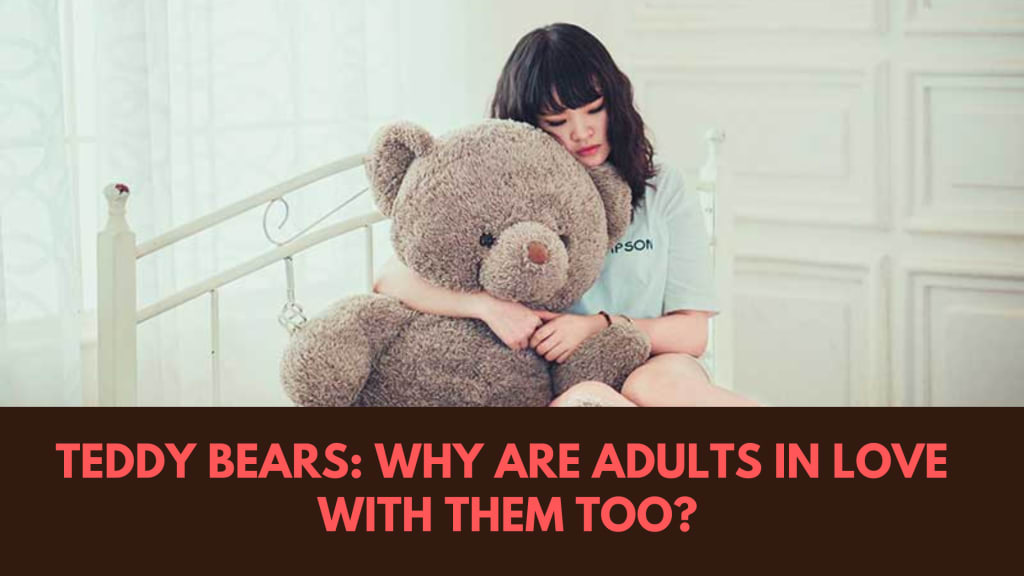Teddy Bears: Why Are Adults In Love With Them Too?
All About Teddy Bear

Despite the fact that stuffed animals are frequently linked with kids, a recent poll revealed that 43% of adults still own soft toys from their younger years.
The following is what psychology has to say about adults who keep stuffed animals.
Having stuffed animals as an adult is very appropriate in psychologists' eyes. Children use teddy bears and soft blankets as transitional goods as they move from dependence to independence. This is most usually used when a child must spend the night apart from their mother or alone. They grasp this reassuring object before going to sleep.
The phrase "transitional object," which can be referred to as comfort items that might lessen our separation anxiety and make us feel less lonely, was created by clinical psychologist and pediatrician Donald Winnicott.
You're not the only adult who develops a connection to soft toys. A whopping 40 percent of individuals still sleep with a stuffed animal in their youth, with a substantial proportion of millennials.
For instance, compared to the 77 percent of women who still keep stuffed animals in their beds, 84 percent of the males who made up the survey's 43% of 2,000 respondents own at least one.
The Best Benefits!
- Our brains and psyche are hardwired to recognize our stuffed animals as comforting objects even well into adulthood because they offered comfort to us as children. They can be consoling, particularly during trying times.
- Sometimes, sleeping with a teddy bear is just about the softness. Some adults still use them as pillows would in their sleep out of habit. On the other hand, some people are unable to sleep at all without their stuffed animals. Therefore, if you use a stuffed animal to help you sleep in order to improve your quality of sleep, psychologists see nothing wrong with it. Apart from alcohol and narcotics, anything that makes you fall asleep more quickly is beneficial. But is it odd to sleep with plush animals?
- Even psychologists agree that having stuffed animals around improves mental health. Dr. Aniko Dunn, a licensed psychologist, highly recommends them for those with PTSD, bipolar illness, and other mental health conditions.
- Teddy bears have been linked to minimizing loneliness in childhood, which can last into adulthood. Since humans are social creatures, they will go to any lengths to prevent loneliness. Our stuffed animals can surely decrease the worry that comes with spending the night alone, even though they may never completely replace interpersonal interaction. Below is a list of the best plush animals for anxiety.
- It can be reassuring when we link a doll or plush animal with safety, especially if we did so as youngsters. We commonly go through major life changes at this age, whether it's moving away for college, quitting our jobs, or completely leaving home. As a result, clinging to anything that is soothing and releases tension is only natural. It makes sense that this would be a Giant teddy bear.
- Few individuals are aware that stuffed animals have the power to alleviate severe prior suffering. They can be helpful for "re-parenting," when the trauma survivor uses them to recover from traumatic childhood events, particularly if they experienced neglect or abuse. The child can learn to love and care for the teddy bear in the same way they should love and care for themselves. They can communicate their loving feelings through the Big teddy bear, which will also help them feel better about themselves.
- We frequently get the impression that they are idly living their lives. A sense of nostalgia can be evoked by cuddling with a stuffed animal, whether it is recollections of our parents and siblings or feelings of safety and cuddling, which can offer continuity and support to our current selves. Additionally, nostalgia tends to make us happier.
- Animals, whether they are stuffed or live, help reduce stress. Petting animals can help our bodies produce less cortisol. Your body will appreciate it if you pet or squeeze your favorite teddy bear. According to research, high cortisol levels are associated with weight gain and a higher risk of cardiovascular disease.
Is There A Stigma On Having A Teddy Bear?
It varies. You may be concerned about the stigma associated with your attachment to plush toys as an adult because they are typically associated with children.
If you're still not persuaded that it's appropriate, keep in mind that 43% of respondents freely acknowledged still owning childhood teddies.
Of course, you still have to think about the role the stuffed animal plays in your life. Do you find it difficult to build deeper relationships with others and turn to your Huge teddy bear for solace instead? Is shame a factor in your relationship with plush toys? You need to be on the lookout for those few items.
In The End!
If you're curious about what psychology has to say about sleeping with a teddy bear, know that it's not a bad thing. Many psychologists agree with it as well.
If they provide you with protection and comfort, they strongly encourage you to retain that link.
If your relationship with the stuffed animal is negatively impacting your quality of life or causing you a lot of worry, it might be time to reconsider it. It could be necessary to heal any underlying trauma first.
About the Creator
Alex Murphy
Alex Murphy Marketing Manager of Boo Bear Factory. Are you looking for a comfy friend to share secrets with? Then, what would be better than to buy Giant Teddy Bear! Shop Giant Teddy bear from Boo Bear Factory and Enjoy huge discount
Enjoyed the story? Support the Creator.
Subscribe for free to receive all their stories in your feed. You could also pledge your support or give them a one-off tip, letting them know you appreciate their work.






Comments
There are no comments for this story
Be the first to respond and start the conversation.